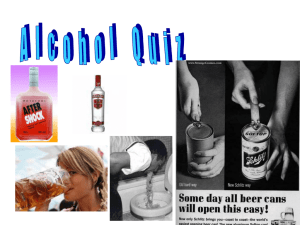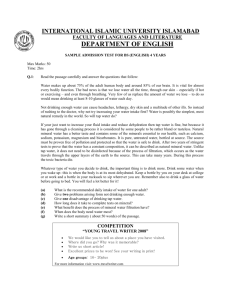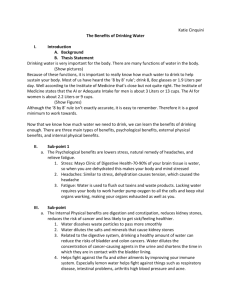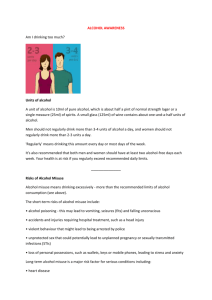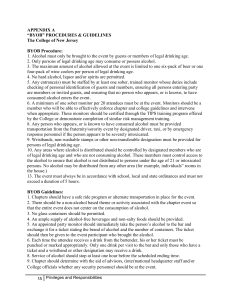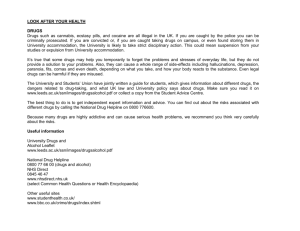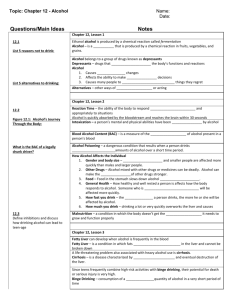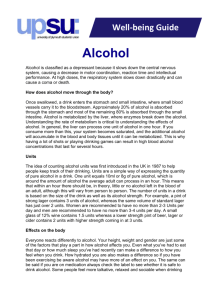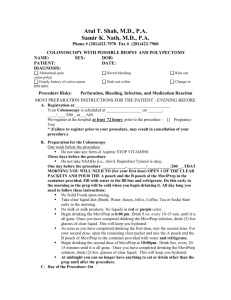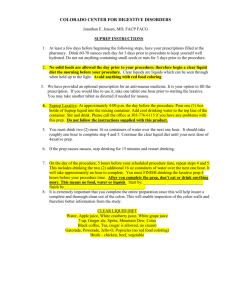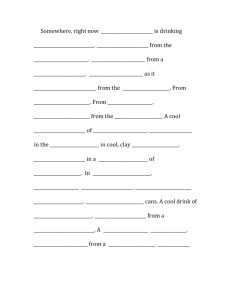Men - NHS Tower Hamlets CCG
advertisement
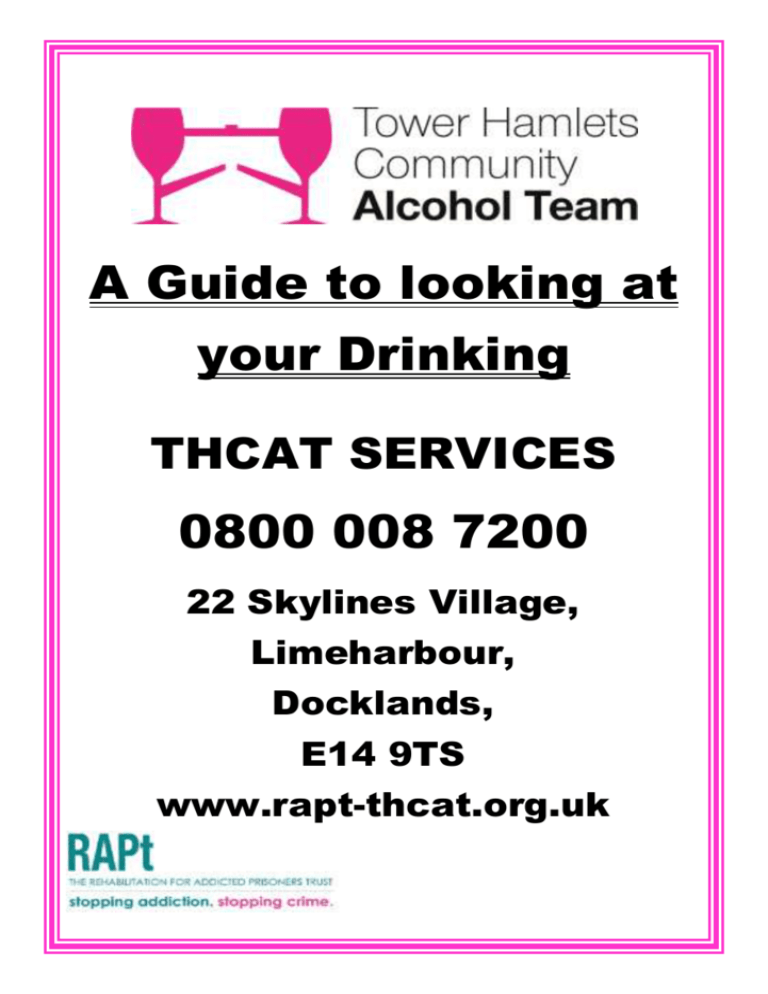
A Guide to looking at your Drinking THCAT SERVICES 0800 008 7200 22 Skylines Village, Limeharbour, Docklands, E14 9TS www.rapt-thcat.org.uk Where to get help THCAT is an alcohol service based in Tower Hamlets which offers advice and information to residents of Tower Hamlets who are 18 or over about alcohol and associated problems. What Type of Drinker are you? Dependant Drinker – people who are showing signs of alcohol addiction. Harmful Drinker – Heavy Drinkers who are causing themselves harm (mental or physical) but not yet dependant. Hazardous Drinkers – People who are putting themselves at risk of harm but this may not yet have impacted on them, their family or community. Safer Drinking - Drinking at either recommended levels or below Drop in Service Wednesday: WE PROVIDE: • • • • • • • Brief interventions Drop-in sessions Comprehensive assessment & Care planning 2pm - 4pm 1:1/ Key work sessions Thursday: Psychosocial structured group work packages 10am – 1pm Community detox Pathways into residential treatment • Counselling • Peer support • Mutual Aid: AA & SMART Recovery • Fam Anon/ Carer’s group • ETE/ Benefits and housing support • Onward referrals For up to date information on what we offer please call THCAT on 0207 093 2669 THCAT: 22 Skylines Village, Docklands, E14 9TS T: 0207 093 2669 F: 0207 987 2721 E: newalcoholservice@rapt.org.uk KNOW YOUR UNITS Risk Women Common Effects Lower Risk No more than 3-4 units per day on a regular basis No more than 2-3 units per day on a regular basis Increasing Risk More than 2-3 units per day on a regular basis More than 6 units per day on a regular basis or more than 35 units per week Higher Risk Men More than 3-4 units per day on a regular basis More than 8 units per day on a regular basis or more than 50 units per week Increased relaxation Sociability Reduced risk of heart disease Low energy Memory loss Relationship Problems Depression Insomnia Impotence Injury Alcohol dependence High blood pressure Liver disease cancer There are times when you will be at risk even after 1 or 2 units i.e. with strenuous exercise, operating heavy machinery, driving or if you are on certain medication. If you are pregnant or trying to conceive, it is recommended that you avoid drinking alcohol. Central Nervous System (Brain & Spinal Cord) Impaired senses – vision, hearing dulled smell, decreased pain perception Altered sense of time & space Impaired motor skills, slow reaction Impaired judgement, confusion Hallucinations Fits, blackouts Tingling & loss of sensation in hands & feet Circulatory System High blood pressure Irregular heartbeat Damage to heart muscle Increased risk of heart attack & stroke Gastrointestinal System Stomach lining inflamed & irritated Ulcers Loss of appetite, nausea, diarrhoea cancer Liver Swollen, painful Cirrhosis Cancer Fluid build up Liver failure, coma & death Pancreas Painful, inflamed bleeding General Body Weight gain Headaches Muscle weakness Pregnancy & Babies Fetal alcohol syndrome/fetal alcohol effects – small head, possible brain damage, retarded growth & development Reproductive System (Male & Female) Reduced fertility Impaired sexual performance Decreased sperm count Increased breast cancer risk (females) Early onset menopause Irregular menstrual cycle The Benefits of Cutting Down: Psychological/Social/Financial Improved Mood Improved Relationships Reduced Risks Of Drink Driving Save Money Physical Sleep Better More Energy Lose Weight No Hangovers Reduced Risk Of Injury Improved Memory Better Physical Shape Reduced Risk Of High Blood Pressure Reduced Risk Of Cancer Reduced Risk Of Liver Disease Reduced Risk Of Brain Damage Making your plan When you’re bored or stressed have a workout instead of drinking Avoid going to the pub after work Plan activities & task at those times you would usually drink Have your first drink after starting to eat Avoid drinking in rounds or large groups Switch to low alcohol beer/lager What targets should you aim for? Men: Should not drink more than 3-4 units of alcohol a day Women: Should not drink more than 2 -3 units of alcohol a day “Regularly” means drinking every day or most days of the week. You should also take a break for 48 hours after a heavy session to let your body recover. Helpline Contact Details: AA – 0845 769 755 www.alcoholics-anoymous.org.uk NA – 0300 999 1212 www.ukna.org.uk CA – 0800 612 0225 www.cauk.org.uk AL ANON – 0207 403 0888 www.al-anonuk.org.uk FAM ANON – 0845 120 0660 www.famanon.org.uk SAMARATIANS – 0845 790 9090 www.samaratians.org DRINKLINE – 0800 917 8282 NHS Choices Alcohol Pages www.nhs.uk/livewell/Alcohol Down you drink www.downyourdrink.org.uk Drinkaware www.drinkaware.co.uk www.alcohollearningcentre.org.uk www.alcoholacademy.net Audit C Questions How often do you have a drink containing alcohol? How many units do you drink on a typical day when you are drinking? How often have you had 6 or more units if female, or 8 or more unit if male, on a single occasion in the last year? Total: Monthly or less 1 5-6 2-4 times per month 2 Weekly 7-9 2-3 time per week 3 Daily or almost daily 10+ 4+ times per week 4 Scoring System Never 3-4 Monthly 0 1-2 Less than Monthly Never A score of less than 5 indicates lower risk drinking. Scores of 5+ require a full Audit to be completed. Your Score

